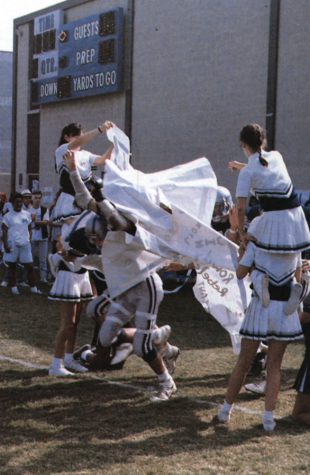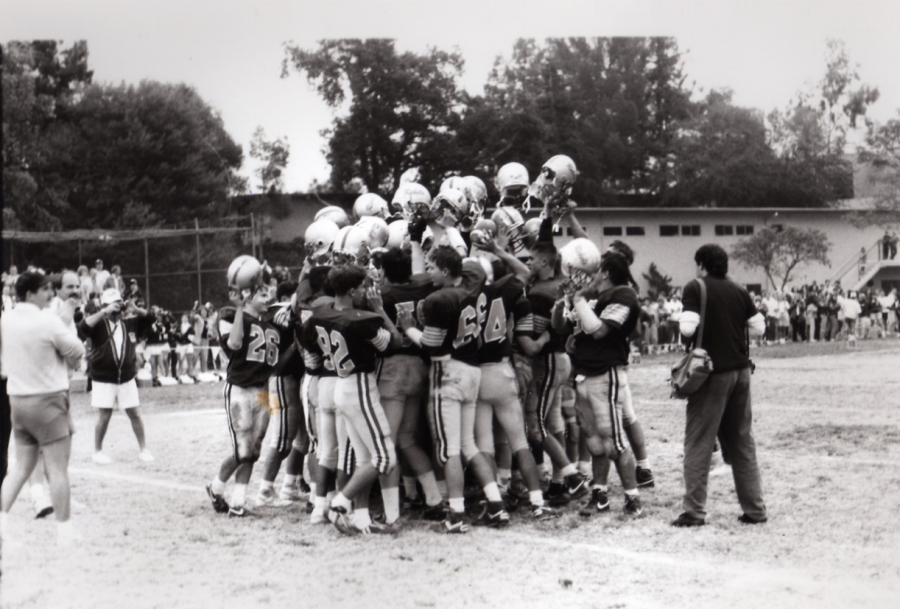Prep’s Coaches Tackle Tough Questions on the Future of the Football Program
There can be no doubt that football is one of America’s most popular sports. Nearly a third of the country watches the Superbowl each year and Sunday night football consistently draws tens of millions of viewers. Football is the most popular high school sport by a long shot, with just over a million student athletes participating each year. Most countries have a sport that reflects elements of their national character, that inspires and entertains large segments of the citizenry, and that has players who are almost national celebrities. In the United States, that sport is football. However, even at a time when football is flourishing on a national level, high school football participation is falling. What are the possible causes of this trend and does it portend football’s declining status as the chosen sport of hard-working and relentlessly dedicated student-athletes?
In the past ten years, high school football participation has dropped approximately ten percent, according to the National Federation of State High School Associations or NFHS. These national trends are also reflected in Prep’s football program. While Prep has traditionally fielded a JV football team, during the past few years, there have not been enough interested players to justify organizing a JV team. Dr. Kurt Hofer, who attended Prep just after the turn of the 21st century and teaches history at Prep, believes that the school has become less sports-oriented over time. He said, “My perception is that we have become a little bit more of an arts and academics focused school.” It is not surprising, then, that this change in culture would likely lead to a decrease in the number of students willing to participate in a sport as physically demanding as football.
Ramses Barden, who attended Prep at roughly the same time as Dr. Hofer and now coaches football at Prep, shared his thoughts on how the rising popularity of water polo has diminished the pool of potential athletes the football program draws on. Both are fall sports, meaning student athletes must choose only one to play. Coach Ramses said, “the water polo team seems to be occupying the space that football did for so many decades…. The men’s water polo team has a reputation for being tough and relentless and hardworking and popular, all qualities that football has been associated with for many years.”

In addition to the cultural changes and the rising popularity of water polo at Prep, there have also been well-publicized discussions concerning the safety of tackle football, especially at the professional level. This commentary may have created unwarranted or unjustified impressions in the public mind concerning the dangers of playing high school football. Russel White, the head football coach at Prep, expressed that the risk of brain injury in high school football has been exaggerated by the failure to distinguish studies done on players at different levels. He said, “When those case studies come out, they are doing them on… high level football players…. We are so far removed from that.” NFL players hit a lot harder than your average high school player just looking to have some fun and get stronger. Unfortunately, people do not take this into account when they see newspaper stories about brain damage in NFL players or Division one collegiate athletes. Ironically, as Coach White notes, sports perceived as safer, such as soccer, have been shown to have nearly the same rate of concussions among players as football.
No contact sport can be played without taking some risks, and football is obviously no exception to that rule. Those who frequently play football describe it as a unique and special sport. Both Coach Barden and Coach White highlight football as a sport uniquely capable of teaching certain values to young men, such as determination, tenacity, grit, bravery, resilience, and hardiness. Participation in any type of sport is likely teach some valuable life lessons. However, It can be argued that football teaches certain types of traditional virtues more effectively than other sports for the very same reason it is viewed by some as too dangerous. The intensely physical nature of the game, involving more contact than almost any other sport, means that players must develop these character virtues in order to perform well. The football field attracts those students who believe that the game is an effective way to test and improve their character. These students deserve our support, as do our football coaches, who, in the face of changes in school culture, the relative popularity of other sports, and the perhaps exaggerated fears concerning the dangers of football, are doing their best to develop ways to protect football players and encourage greater participation in one of America’s most iconic pastimes.







